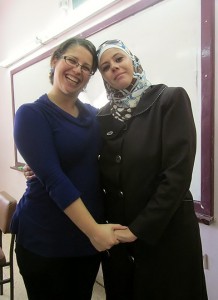
Shadea Mitchell, 2010-2011, Jordan (left), with English teacher Mrs. Ghada at the Al-Ittihad School for Girls in Amman
My time as a Fulbright English Teaching Assistant (ETA) in Jordan was spent primarily in the middle school classrooms of the Al-Ittihad School for Girls, encouraging students to utilize their English conversation skills while also serving as a resource to other English language instructors.
Midway through my Fulbright year, I convinced my supervisor, the school’s seventh grade English instructor, to allow me to lead weekly conversation sessions. Since many students were already well-spoken and comfortable making small talk in English, I wanted to contribute to the English classes in a meaningful way and thought this would be especially beneficial to the older girls. I wanted to encourage them to discuss more interesting topics than those covered in their textbooks but I didn’t intend to discuss anything controversial. Nevertheless, there were a few times when their curiosity led to some intense but rewarding discussions.
During a memorable conversation session, one group asked me a series of questions regarding the differences between courtship and marriage in the United States and Jordan. They asked, “Miss, do you have a boyfriend? Miss, do you drink?”
I knew entering into this conversation that there was an underlying religious sentiment, but I didn’t want to skirt their questions. I felt that not being truthful would be worse than admitting the truth, so I explained, as best as I could to a classroom of 14 year olds, the rationale behind my personal choices. “Well, I drink in moderation to celebrate special occasions…”
Their reaction was to convince me that my behavior was haram, or forbidden, and to earnestly explain why I should become a Muslim. I graciously expressed my appreciation for their concern while being respectful of their beliefs. The next day, the school’s religion teacher lightly admonished me for allowing the topic to be discussed, but there weren’t any serious consequences with the school or my relationships with other teachers.
Throughout the year, there were many more difficult topics broached with my colleagues and friends, ranging from why U.S. women presumably don’t respect their fathers, the United States’ assassination of Osama bin Laden, to the perceived hypocrisy of U.S. foreign policy in the Middle East. I wasn’t exactly sure what a “cultural ambassador” was before arriving in Amman, but after having conversations with the Jordanians I met and worked with during my grant, it’s now clear to me that these exchanges are the one of most essential parts of being a Fulbrighter.
Consequently, the biggest piece of advice that I can give to anyone seeking to become a Fulbright ETA is this: demonstrate you are able to navigate challenging but instructive conversations. More than anything else I did in Jordan, the interactions I had with the people around me were a platform for promoting civil, cultural dialogue and served to forward the mission of the Fulbright Program. They certainly increased my respect for and understanding of my friends and colleagues in Jordan, and hopefully, they can say the same about me.
Do you have questions for Shadea? She can be contacted as a Fulbright Alumni Ambassador at SMitchell.AlumniAmbassador@fulbrightmail.org.

2 Comments
I my name is Mustapha Hameed Abdullahi I need help to be able to get into the program and to have experience on how to deal with the student it will be a great pleasure if you are willing to lend a help hand indeed.
Thanks Shadea Mitchell
Mustapha,
To learn more about the Fulbright Program and which grant opportunities, please visit http://www.eca.state.gov/fulbright.
Good luck!